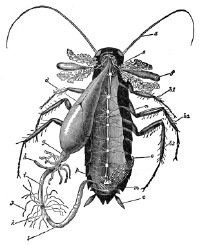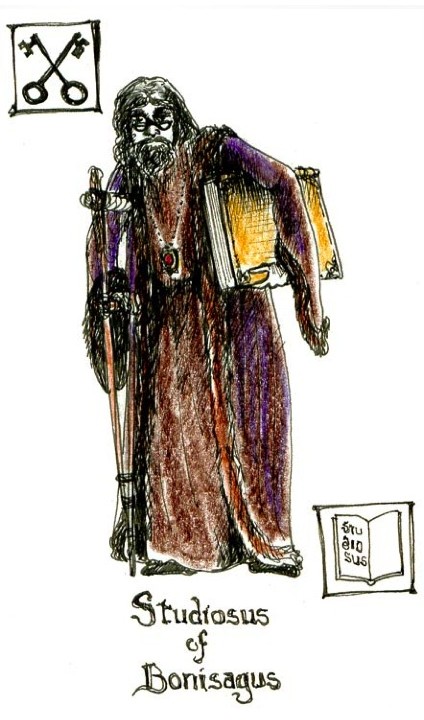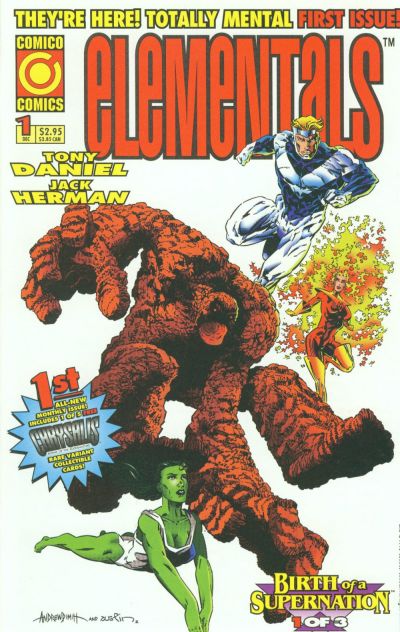This was the second "mini-convention" organized at a game store in Oakland, called "End Game", which was organized in collaboration with RPGnet. I'd been to the previous event the previous April (cf. my End Game April Fool's 2006 Mini-Con Report for the details).
There were 17 events scheduled in three time slots of 4 hours each (10AM-2PM, 3PM-7PM, and 7PM to 11PM). I think most but not all of the scheduled games ran. For this one, my games were The Shab Al-Hiri Roach, Ars Magica, and Truth & Justice.

This was a straightforward introduction to the system, playing it as-written. The organizer had taken a bunch of notes to help verbally explain the system to those new to it (which we all essentially were). However, there was no other special preparation other than printing out character sheets. The event description was simply:
The Shab-al-Hiri Roach is a dark comedy of manners, lampooning academia and asking players to answer a difficult question - are you willing to swallow a soul-eating telepathic insect bent on destroying human civilization?
No?
Even if it will get you tenure?
A fast paced and hilarious game, The Shab-al-Hiri Roach requires no Game Master and can be played in a single evening. If you enjoy crazed one-upmanship, furious stake-setting, and chanting gutteral commands in Sumerian, The Roach would like to have a word with you.
The organizer, Chris, proceeded with explaining the system and the procedure for creating characters. Most people came up with character concepts fairly quickly. Elliot went with a gay Southern professor of Classics; Chris Bennett made a sporty rowing-obsessed instructor who barely managed a philosophy degree; Mark made a drunken Scottish professor of physics; Brian made an egotistical German professor of mathematics; Chris Hanrahan made an adventurous professor of archeology. I got a little stuck, but then went with an obsessive professor of astronomy convinced that the stars were almost right -- a soon-to-be cultist already leading depraved secret society meetings. We then formalized our departments, selected enthusiasms, and went around the table defining our connections. That was one of the funnest bits of the game -- we all loved the irony of the person you like always hating you.
| Player | Character | Department | Enthusiasms | Connections |
|---|---|---|---|---|
| Chris Bennett | Asst. Prof. Phineas Coburn | Philosophy |
Sport Wit |
Hates Montague for their unnatural pairing after a drunken staff party Likes Huggins in guilt over accidentally drowning his son |
| Chris Hanrahan | Asst. Prof. Edward Huggins | Anthropology |
... ... |
Likes Templeton for his astronomical expertise Hates Coburn as a stupid jock |
| John Kim | Prof. St. John Templeton | Astronomy |
Creativity Self-Destruction |
Likes McLeod for supplying booze for his ritual Hates Huggins for disputing Templar history |
| Mark MacVicar | Prof. Dante McLeod | Physics |
Debauchery (?Gossip?) |
Hates Templeton for wasting fine spirits on a whore Likes Von Schtoffer for his brilliant advice |
| Brian Isikoff | Prof. Erick Von Schtoffer | Mathematics |
(?Gossip?) Manipulation |
Hates McLeod for profiting from his ideas Likes Montague for his good gossip |
| Elliot Wilen | Asst. Prof. Ashley Montague III | Foreign & Ancient Languages |
Pleasure ... |
Hates Von Schtoffer as a crushing bore Likes Coburn as an attractive, athletic man |
So after character creation, we explained more about the cards and dice mechanics, which had only been briefly covered earlier. We discussed our lines of horror -- and seemed to agree that anything went so long as it was not graphically described. We then started with the convocation. We did stop a number of times to review the rules. At first, we thought that the outcome of a conflict affected whether the Opportunity effect comes to pass -- i.e. it was conditioned on winning a conflict.
Speaking generally about our play, we took to heart the brief advice in the book about "stacking up bodies like cordwood". So we were at each others' throats fairly quickly. It started a lot of accusations flying back and forth over misconduct. Templeton's bizarre rituals, Montague's homosexuality, and Coburn's affairs featured prominently. Then the deaths started, which were prominent. There was little academic squabbling per se. The only real academia was Coburn's brief bid to present a paper on the physics of rowing during the convocation, which was shot down.
The event was scheduled for a 4-hour slot. I'd say roughly half of that was character creation. We got through 4 out of the 6 Events during the remaining time, though not every Event had a full set of six scenes (for the six players). I can't reproduce the whole, but highlights for me included:
As we ran out of time, we were coming to the end of the fourth Event, the Homecoming Football Game. Everyone except for McLeod and Von Schtoffer were controlled by the roach. Templeton (my character) was in the lead for Reputation with 11, followed second by Huggins with 10. Huggins had just doubled his Reputation in a last-minute all-or-nothing gamble. However, McLeod was not roach-bound and had a strong lead with roughly 4 Reputation over Von Schtoffer with 1. So Mark was the winner.
I reflected afterwards on the winning/losing aspect. I feel like I did push things a bit far in both nastiness and collecting-points aspect (which go together to a degree). However, at the end it seemed pretty random whether you are eligible to win or not -- since you can be roach-ified by a card at any point. Odds are pretty good that you'll draw a roach card at some point -- and if you only get one roach card, then you're stuck that way to the end of the game and therefore can't win. Then again, maybe I'm missing something.
A bit of conflict confusion, but still a great game.

This was a murder-mystery scenario for Ars Magica game-mastered by Erik Dahl, where the PCs were all magi from different covenants and houses who came together for a negotiation and became investigators and suspects in a murder. I learned later that this was one of two demo adventures distributed by Atlas Games -- so I'll try to avoid spoilers in here. The event description was:
A group of powerful magi have gathered to negotiate harvest rights to newly-found magical resources, when foul murder upsets their plans. Can they identify the culprit before the authorities take over, laying all of their mysteries and secrets bare?
The four players met up: they were John D'Amanda (whom I'd seen previously at local cons), Elliot (who has been in my Hârn group), Mattea (whom I didn't know), and myself. I was the only one who knew Ars Magica -- two were completely new to it, one only vaguely familiar. The GM Erik noted that there were going to be secrets on the character sheets, so he prepared to describe them. Interestingly, we all agreed to just distribute the characters randomly instead. The characters were each powerful magi (well above starting levels) from different covenants, who had met for diplomatic talks at the private retreat of another magus, Septus of Bonisagus. There were six PCs prepared -- one was left out, one was played as an NPC by the GM. So the PCs were:
The character sheets were quite nicely done -- with a decent color illustration of each character, and two double-sided pages of information, including personalized descriptions of the other PCs, descriptions with each of the Virtues/Flaws, and of course complete stats and spells. The one thing which grated on me were the joke Latin names, which didn't at all fit with a fairly serious adventure. Moreover, though, I realized going in that the basic set-up of the scenario had many hurdles from the start:
Now, despite these hurdles in the concept, play went fairly well. There was a lot of time taken up in learning the system (magic in particular), but the same is true for most demo games. Highlights were the accusation scenes among the PCs, and browbeating the servants in the tower.

This was a superhero event using the Truth & Justice system, game-mastered by Mike Bogan, and based on the Elemental comics series written and drawn by Bill Willingham. In an interesting bit of RPG/comic history, the villains from the comic originally appeared in two supplements for the superhero game Villains & Vigilantes written by Willingham: "Death Duel with the Destroyers" and "The Island of Dr. Apocalypse". He later adapted this material into the comic series published by Comico. The event description was:
As if dying and being resurrected as a superpowered being wasn't weird enough, now there's another group of superpowered beings after you. Who are these so called "Destroyers"? Who do they serve? And most importantly, what do they want with you? (Inspired by the Villains & Vigilantes module and Elementals comics, both by Bill Willingham).
There were four pre-made heroes based on the comic-book heroes:
These were created in T&J to be roughly the same as the originals, except that we picked the gender of our characters for ourselves without knowing the originals. The other players were all male and picked male characters. I decided that given a 13-year-old superpowered brick, it would be more interesting as a 13-year-old girl.
The adventure started immediately after our origin -- in which we appeared on the beach in San Francisco three months after we had died in seemingly unrelated incidents. A mystical vision had conveying our powers and told us of our purpose to maintain the cosmic balance of nature. Being officially dead and dressed only in colorful skintight costumes rather limited our options.
During play, there were a few rough spots with the system. Basically, the system is extremely fast and loose. There were a few tricky points we ran into, particularly with damage for Super-strength and Super-armor. I think a printed character really needs more text explanation of the powers rather than just listing the raw power names which are quite vague.
Without spoiling too much of the plot, basically we ran into the first encounter and then sidestepped the second encounter to head straight for what would be a second adventure. Our mission was cut short, though, by a long fight with a group of supervillains. After that fight wound up, we were nearly out of time and simply broke into meta-discussion of the plot and background.
The mini-con format works pretty well. It's small, simple, and easy to try out new games and meet new role-players. My one complaint remained the lack of a dinner break in the schedule. However, the organizer, Chris Hanrahan, eventually responded positively to my suggesting this.